|
      |
 |  |  |  |  |
 |  |

The seven men charged with providing material support to Al Qaeda are U.S. citizens of Yemeni background who grew up in Lackawanna, New York. They lived in a tight-knit Arab community, but most were all-American teenagers who played soccer together and enjoyed going to parties.
All seven allegedly traveled to the Al Farooq training camp in Afghanistan in the summer of 2001; six returned to the U.S. When questioned after their return, four of the men said they had attended religious seminars in Pakistan. No one mentioned the trip to Afghanistan until Mukhtar al-Bakri was picked up by Bahraini police and questioned by FBI agents in Bahrain on Sept. 11, 2002.
Six members of the alleged cell were arrested and have pled guilty to aiding a terrorist organization. They received sentences of between seven and 10 years in prison in December 2003. The seventh member, Jaber Elbaneh, is a fugitive believed to be in Yemen. In September 2003, the U.S. government announced a $5 million reward offered for his capture.
| |
 |
|
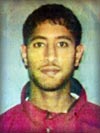

Yasein Taher was voted "friendliest" by his 1996 graduating class at Lackawanna High School. Five years later, in the spring of 2001, he was in an Al Qaeda training camp attending military lectures and learning how to use a Kalashnikov.
The 25-year-old former soccer team co-captain married his high school sweetheart, a former cheerleader. Friends said Taher became more interested in Islam as he entered his early twenties. When he returned from the camp in Afghanistan, relatives said he appeared less devout, going out to nightclubs again and shaving his beard.
Taher worked at a collection agency and had attended a local community college. He was living with his mother at the time of his arrest. He pled guilty in May 2003 to providing material support to Al Qaeda, and was sentenced to an eight-year prison term in December 2003.
 | |  |  |
|
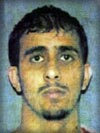

Described by his lawyer as a "sports nut," Shafal Mosed, 25, was a frequent gambler at the casinos across the border in Canada, according to members of the Lackawanna community. "He had his wild side," a friend remembers.
Mosed was enrolled in community college and worked as a telemarketer at the time of his arrest. He was living with his wife and two-year-old son. He also cared for his disabled mother.
Mosed pled guilty to material support in March 2003. In his plea deal with the U.S. government, he admitted to knowing beforehand that the planned trip was illegal and that the training camp they were going to was associated with Osama bin Laden. He said he performed guard duty at the camp and also received training in mountain climbing and weapons. He told the government that he heard bin Laden speak of "50 men who were on a suicide mission" when the Al Qaeda leader visited the camp. Mosed was sentenced to eight years in prison in December 2003.
 | |  |  |
|
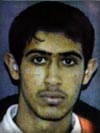

At the request of the CIA, Bahraini police picked up Mukhtar al-Bakri, 23, on his wedding night from a hotel room in the capital city of Manama. FBI agent Gamal Abdel-Hafiz interviewed him the next day, Sept. 11, 2002. During a subsequent interrogation, al-Bakri admitted he trained in the use of weapons and explosives at an Al Qaeda camp.
Al-Bakri was the first to admit that the group had not attended religious training in Pakistan, but rather traveled to the terrorist training camp in Afghanistan. His confession paved the way for the FBI to bring charges against the Lackwanna men.
In Afghanistan, al-Bakri and the others met Osama bin Laden, who visited the camp. Al-Bakri says he told the Al Qaeda leader he was worried because his parents didn't know where he was. He hoped that he would be allowed to leave but he says bin Laden responded by suggesting he write his parents a letter, telling them where he was. Al-Bakri also said that he was made to stay an additional week at the camp for "extra training."
Al-Bakri came under increased surveillance after the U.S. government reviewed and analyzed an e-mail he sent while traveling in Saudi Arabia months before his arrest. The e-mail referred to an upcoming "big meal" that authorities interpreted as a code for an impending terrorist attack. Al-Bakri told the FBI he had overheard a conversation about an attack but did not know any details. He said he had used a code because he was afraid his e-mail was being monitored.
Al-Bakri says in his heart, he never considered himself an Al Qaeda member despite having attended the training camp.
In June 2003, he was the last of the six arrested men to plead guilty to material support, and he was sentenced to a 10-year prison term in December 2003.
 | |  |  |
|
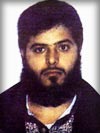

In May 2003, the U.S. government unsealed an indictment charging Jaber Elbaneh, 37, with providing material support to Al Qaeda.
According to Sahim Alwan, Elbaneh admired Kamal Derwish who encouraged the young Lackwanna men to become more religious. Derwish, who is believed to have been an Al Qaeda recruiter, organized the summer 2001 trip into Afghanistan.
Elbaneh traveled to Afghanistan with al-Bakri, Alwan and Yahya Goba. At the camp, Elbaneh told Alwan that he wanted to fight with the Taliban and was willing to become a martyr.
Elbaneh never returned to the U.S. after his trip to Afghanistan and in September 2003, the FBI announced a $5 million reward for information leading to his arrest. He was believed to be living in Yemen.
January 2004 Update: According to U.S. and Yemeni officials familiar with the case, Elbaneh has been taken into custody in Yemen. These officials gave no details of his arrest, but U.S. officials say that negotiations concerning Elbaneh's possible extradition are under way between the U.S. and Yemeni governments.
 | |  |  |
|
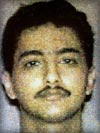

Sahim Alwan, 30, is a college-educated, married man with three children who worked as a counselor with the Iroquois Job Corps Center, a job training facility located in Medina, NY. He was active in the Lackawanna Yemeni community and served as president of the mosque.
He is the first American citizen to have gone to an Al Qaeda training camp, met personally with Osama bin Laden and given a formal interview about his experience.
Today, Alwan says he regrets the trip and maintains that he never intended to become a terrorist. Even though he knew going to Afghanistan was wrong, he admits he let his curiosity get the better of him.
Hungry to learn more about Islam, Alwan says he was frustrated by the limited opportunities to study his religion in depth in Lackawanna. When Alwan first met fellow Yemeni-American Kamal Derwish, he was intrigued by this "very likable guy" who seemed knowledgeable about Islam.
In spring 2001, with Derwish's encouragement, Alwan and the others embarked on their trip. However, Alwan claims he very quickly had a change of heart and begged the camp authorities to let him to return home. He was allowed to leave, but first was taken to a personal meeting with bin Laden, in which the Al Qaeda leader asked about the status of Muslims in the U.S.
After the meeting with bin Laden, Alwan was asked by a bin Laden associate to carry videotapes of the USS Cole bombing to a guesthouse in Pakistan on his way back. Alwan admits to transporting the tapes.
Once Alwan returned home to Lackawanna, he did not report what he'd learned about Al Qaeda to authorities. Despite already having a contact at the FBI from an earlier, unrelated case, Alwan kept silent about his trip, even after the Sept. 11 attacks. He said he was scared that he'd be turned into a scapegoat at such an emotional time. "We talked about keeping your mouth shut, and just letting this thing die out," he says. After being confronted with information obtained from the arrest and interrogation of Mukhtar al-Bakri, Alwan confessed to FBI agent Edward Needham and was arrested on Sept. 13, 2002. He pled guilty to material support of terrorism in April 2003, and was sentenced to nine and a half years in prison in December 2003.
 | |  |  |
|
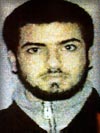

Goba, 26, did not grow up in Lackawanna. Born in the Bronx, he was raised for a while in Yemen, and moved to Western New York in the late 1996. Later he moved in with Al Qaeda recruiter Kamal Derwish. The two men would host Islamic education sessions at their home, where Derwish would lecture, and the group would order pizza and socialize.
In May 2001, Goba traveled with Sahim Alwan, Jaber Elbaneh and Mukhtar al-Bakri to Pakistan, where the group split up and made their way into Afghanistan to an Al Qaeda training camp. Goba was considered one of the group's leaders and after returning from Afghanistan he maintained phone and e-mail communication with Derwish, who remained overseas. In his March 2003 guilty plea, Goba admitted having trained to use firearms, including a rocket-propelled grenade launcher, as well as explosives. He also said that Osama bin Laden had spoken at the camp of men "willing to become martyrs for the cause." In December 2003, Goba was sentenced to the maximum of 10 years in prison.
 | |  |  |
|
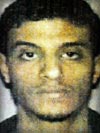

Galab, 27, was a part-owner of a gas station in Lackawanna, where he spent much of his time. Growing up, Galab, like the others, seemed to be a typical American teenager, interested in clothes, partying, and going to casinos. He was a star soccer player and loved watching the Buffalo Sabres hockey team. He spoke only minimal Arabic.
According to his brother Moses, Faysal Galab became interested in religion in his early 20s, when he got married and started having children. Galab traveled with the first group that left for Afghanistan, on April 28, 2001.
In January 2003, Galab was the first of the "Lackawanna Six" to plead guilty to material support of terrorism. In his plea, he admitted to traveling to the camp, knowing that the trip was illegal, and receiving weapons training. He also acknowledged Osama bin Laden had spoken at the camp. Galab, according to the plea agreement, left the camp before he had completed the training course, and eventually returned to Lackawanna with Shafal Mosed and Yasein Taher in June 2001. In December 2003, he was sentenced to seven years in prison.

Roya Aziz and Monica Lam are students at the U.C. Berkeley Graduate School of Journalism.
| |
 |
|
home + introduction + inside a "sleeper cell" + tools of counterterrorism + defending the homeland
fixing the fbi + the new york times story + interviews + discussion
tapes & transcripts + press reaction + credits + privacy policy
FRONTLINE + wgbh + pbsi
posted october 16, 2003
FRONTLINE is a registered trademark of wgbh educational foundation.
web site copyright WGBH educational foundation
|
|